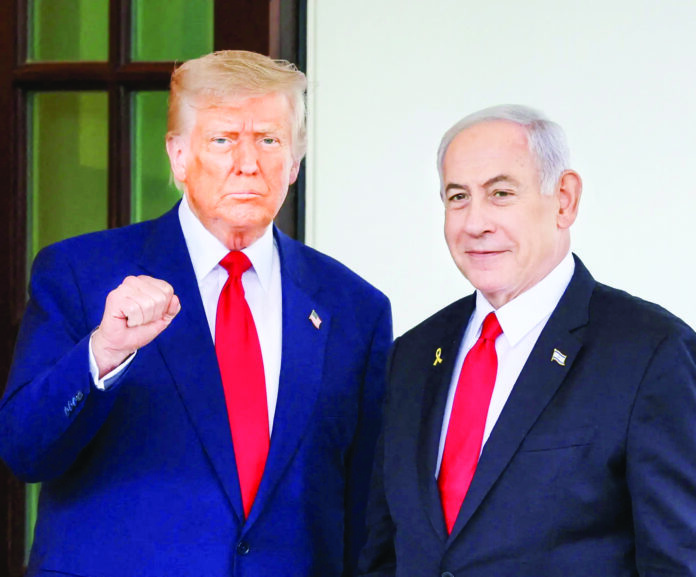Israel’s massive strike on Iran risks regional war; Trump must reclaim control, restart diplomacy, and stop escalation before it’s too late.
LONDON: It was always likely to happen, but everyone was still taken by surprise when Israel yet again attacked Iran. Justifying the military action and calling Iran’s project to obtain nuclear weapons a clear and present danger to Israel’s very survival, Prime Minister Benjamin Netanyahu announced early on Friday that “Today the Jewish state refuses to be a victim of a nuclear holocaust perpetrated by the Iranian regime. As prime minister, I’ve made it clear time and time again, Israel will never allow those who call for our annihilation to develop the means to achieve that goal. Tonight, Israel backs those words with action. We struck at Iran’s nuclear enrichment programme, we struck at Iran’s nuclear weaponization programme, we targeted Iran’s main enrichment facility in Natanz, we targeted Iran’s leading nuclear scientists working on the nuclear bomb, and we also struck at the heart of Iran’s ballistic missile programme”.
It was certainly a large overnight attack, which Israel named “Rising Lion”. According to Israeli media, around 200 warplanes used 330 munitions against more than 100 targets inside Iran, which killed 78 people and injured 329, mostly women and children in residential areas, according to Iranian media. Later reports from Teheran confirmed that the commander of its Islamic Revolutionary Guards Corps (IRGC), Hossein Salami had been killed in the attack, along with a number of senior military commanders and six of its senior nuclear scientists. Iran’s main uranium enrichment facility at Natanz was struck several times, with smoke seen billowing from a number of its buildings. Natanz operates thousands of advanced centrifuges, equipment used for enriching uranium gas, which are located dozens of metres underground for protection. It’s currently unclear how deep Israel’s attack reached and what damage it did, but the head of the International Atomic Energy Authority (IAEA) told reporters that Iran had confirmed there had been no increase in radiation levels following the attack.
So why did Israel choose this moment to attack Iran? Shortly before the launch of Rising Lion, the country’s defence minister, Israel Katz, told a forum of military officials that “This is a defining moment in the history of the State of Israel and in the history of the Jewish people’. Claiming that Iran is more determined than ever to realise its vision of destroying Israel, Katz continued “We are at a critical juncture. If we miss it, we will have no way to prevent Iran from obtaining nuclear weapons and threaten our existence.” In other words, Katz, a noted hardliner in Netanyahu’s government, sees this as a “now or never” moment. Along with many observers, he may have been alarmed by Wednesday’s announcement by the IAEA that Iran was not complying with its commitment to international nuclear safeguards, the first time in almost 20 years that the organisation had accused Iran of breaching its non-proliferation obligations. “Iran has a very small window to answer the resolution, otherwise it will face massive repercussions, including the potential of further isolation and a wide range of sanctions”. Clearly, by its immediate reaction, Israel closed that window.
“Israel is taking a huge gamble” said Frank Gardner, the BBC’s Security Correspondent on Friday morning. “Its argument runs that it had no choice, that Iran was already accelerating its work towards building a nuclear bomb and that this was its best and possibly last chance to prevent that from happening.” Gardner went on to say that “the counter-argument, however, is more pertinent today than ever before. And that is when the dust settles from this latest Iran-Israel exchange of fire, enough of Iran’s leadership will survive to now race for the bomb”. Hawks in Iran’s security establishment have long argued that it is Iran’s national right to have a nuclear weapon, after all Israel has long possessed nuclear weapons, but no Israeli minister has ever admitted to this. The hawks also insist that having nuclear weapons would be the best deterrent against future attacks. Many will have noted the different paths taken by Libya and North Korea. Libya’s Colonel Gaddafi gave up his weapons of Mass Destruction programme in 2003 and eight years later was dead in a ditch, overthrown by the Arab Spring protest backed by Western air powers. By contrast, Kim Jong-Un’s regime in North Korea has defied Western sanctions and managed to build up a formidable arsenal of nuclear-tipped ballistic missiles. As Gardner noted, “nobody is in a hurry to attack North Korea”.
Meanwhile, the world is watching America’s reaction. During a phone call on Monday, Trump urged Netanyahu not to attack Iran, according to the Wall Street Journal, but by Wednesday the White House began to pull non-essential personnel out of embassies and bases in the Middle East within striking distance of Iran. The Trump administration has attempted to distance itself from the Israeli operation, and unlike in previous attacks on Iran by Israel the US played no active role on the strike or Iran’s retaliatory response of 100 drones, most of which Israel claims to have shot down. In fact, US Secretary of State Marco Rubio explicitly said that the US played no role. On Friday morning however, Washington awoke to an early morning “Truth Social” post by Donald Trump which confusingly appeared to justify the attack and warning Iran to come to the table. In his post, Trump said that he gave Iran “chance after chance” but that “no matter how hard they tried, no matter how close they got, they just couldn’t get it done”.
But could Israel’s highly provocative and strategically timed strike on Friday also be a message from Netanyahu to Trump? During his Middle East visit in May, Donald Trump decided not to visit Israel, following the administration’s decision to conclude a bilateral ceasefire with the Houthis in Yemen without consulting Jerusalem. The next round of Iran-US nuclear talks was due to take place today in Oman, but of course have now been scuppered because of Israel’s action. Join up the dots and you might conclude that Netanyahu has successfully derailed Trump’s regional policies, curtailing America’s diplomatic approach to Iran. By ordering the attack on Iran when he did, Benjamin Netanyahu showed that he is not much concerned with the views of Washington, which he clearly disregarded. His action has reshaped the political and diplomatic environment in the Middle East, carrying the danger of drawing the US directly into the conflict and further moving the region toward a wider war.
Many analysts are of the firm belief, however, that unless another JCPOA-type agreement which Donald Trump so egregiously walked away from in May 2018 can be reached, Iran will inevitably obtain a nuclear weapon. Israel’s current military action will embolden the increasing number of hard-liners in Teheran close to the establishment who will say “look, we now need to race towards developing our nuclear weapon, we’ve got the knowhow and we have the technical capability. Now is the time to seek a deterrent in the same way that North Korea has”. The problem for the region as a whole, however, is that if Iran gets nuclear weapons, Saudi Arabia will almost certainly want to have them as well. Turkey will also want them – and then Egypt. Suddenly the Middle East will be at a very dangerous juncture, bristling with nuclear weapons.
To avoid this, Donald Trump needs to take control of the situation as quickly as possible and re-establish talks with Teheran. Without condemning Israel’s actions, he is sending a clear message that he doesn’t make US policy – Netanyahu does. Trump must stand firm against the powerful Israeli lobby in America and say “no more” to Netanyahu – you created this mess, you must get out of it. The consequences are yours alone to deal with. Just as in Gaza, Netanyahu sees only a military solution to any problem. He’s wrong. Only diplomacy works.
*John Dobson is a former British diplomat, who also worked in UK Prime Minister John Major’s office between 1995 and 1998. He is currently a visiting fellow at the University of Plymouth.








